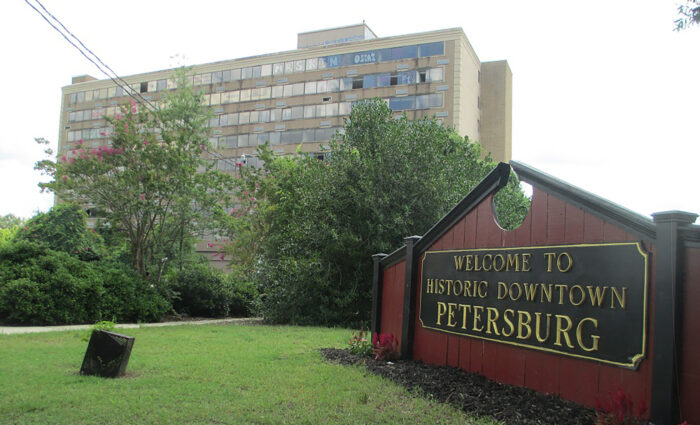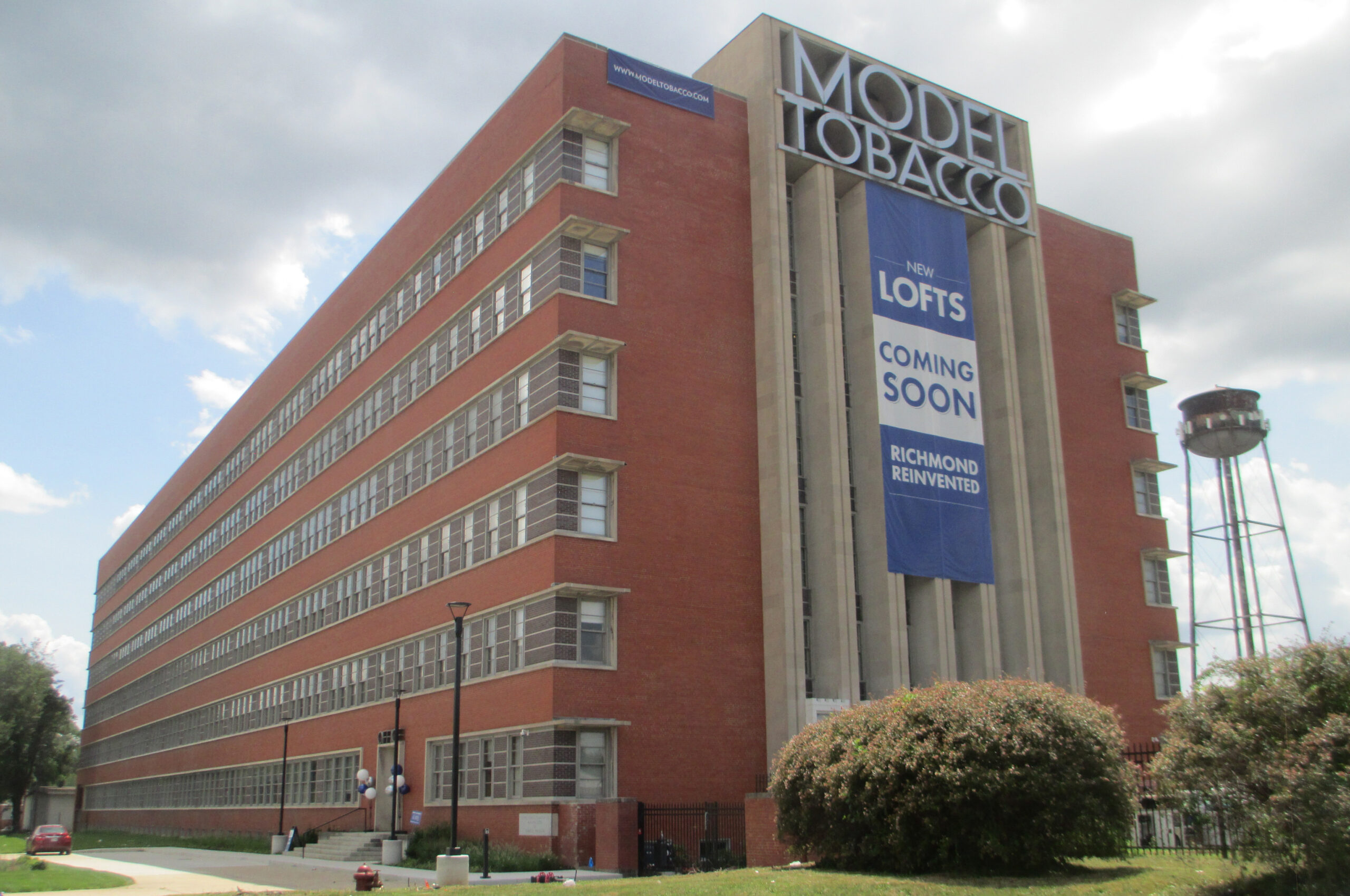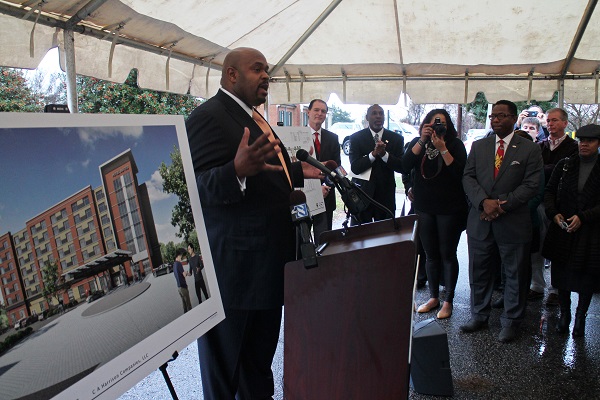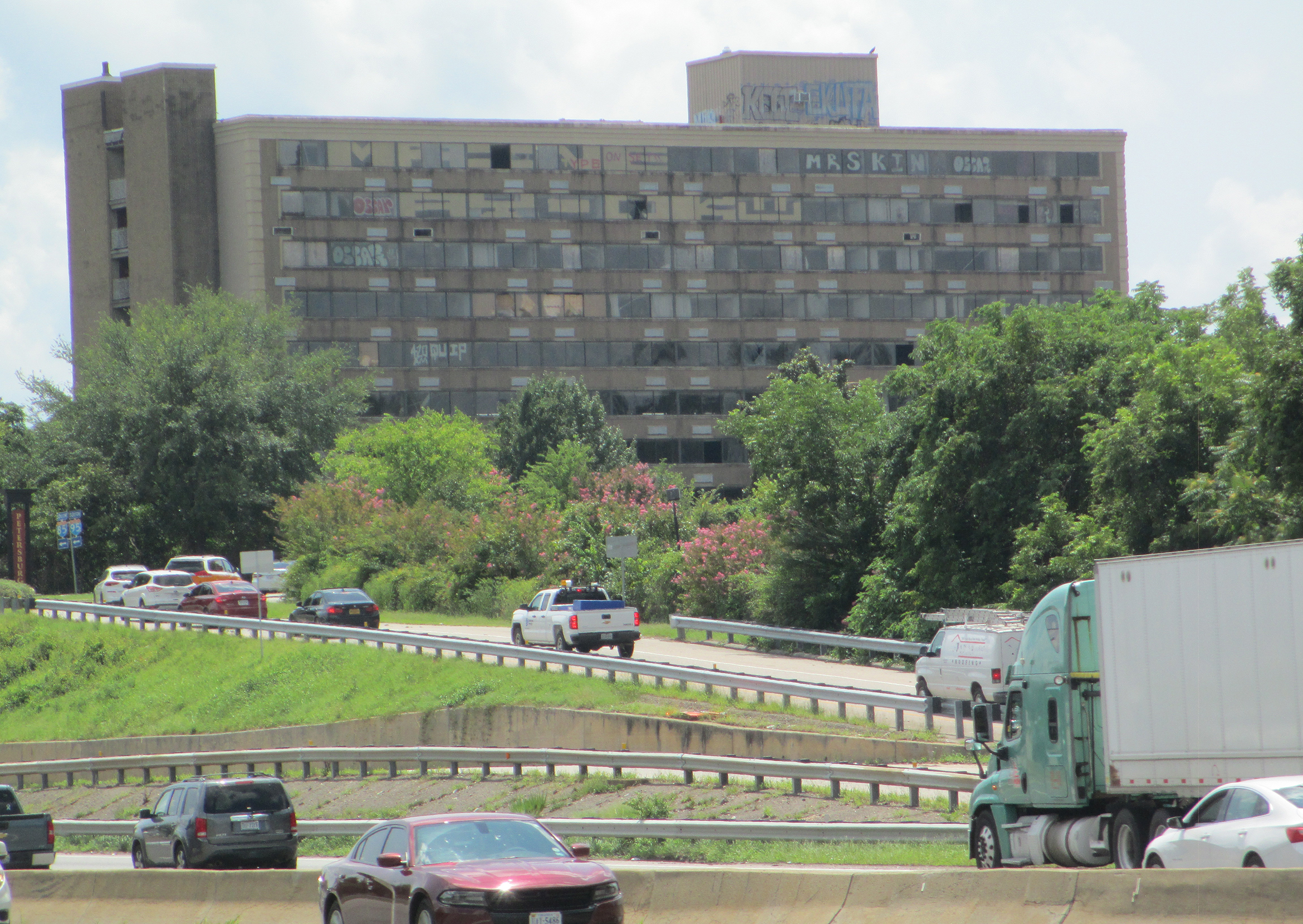As he moves toward finalizing a deal to walk away from a controversial Petersburg hotel project, developer Chris Harrison is fighting back against a federal lawsuit filed by investors of his other high-profile project at the Model Tobacco complex in South Richmond.
Last month, Harrison filed his response to the suit that accuses him of committing fraud and money laundering in an effort to wrest control of the multimillion-dollar Model Tobacco apartment conversion from investors Steven Snider and R. Michael Kuehn.
The suit alleges that Harrison violated the group’s operating agreement with multiple financial transactions that required the investors’ approval, misrepresented the project’s readiness and timeline, and ultimately induced them to put $2.2 million more into the project following delays with financing and the property’s closing.
In his response, Harrison denies the allegations and argues “that there is risk associated with all investments, including timing for obtaining financing and completion of the project itself.” He also argues that the case belongs in state court and requests a hearing on the issue of its filing in federal court.
The response states that Snider and Kuehn caused the delays with financing and the property’s closing when they refused to sign guarantees for equity in the project. It puts the blame on the investors for causing the closing delay and loss of financing from a bank, as well as a loss of potential state and federal historic tax credits.
Harrison argues that the refusal breached the terms of their development group’s operating agreement, and that the lawsuit is an effort by the investors to increase their shares in the group and cast Harrison in a negative light. A counterclaim included in the response seeks a court ruling on the validity of the operating agreement, alleges breach of contract resulting in expenses in excess of $75,000, and seeks dissolution of Snider and Kuehn from the group.
A voicemail left for Harrison on Wednesday was not returned.
Harrison’s attorney in the lawsuit is Todd Fiorella of Norfolk firm Fraim & Fiorella. He did not return a call and email Wednesday.
Snider and Kuehn filed their answer to Harrison’s counterclaims this week. They are represented by a team with the D.C. office of Quinn Emmanuel Urquhart & Sullivan headed up by lead attorney Keith Forst.
Harrison held a ribbon-cutting in June for the Southside apartments, called Model Tobacco Lofts. The 203 apartments make up the first phase of the mixed-use project, which includes plans for an entertainment venue with a beer garden and restaurant space. Harrison said in 2020 that the first phase was estimated to cost about $59 million.
Settlement reached to sell blighted hotel back to Petersburg

The blighted hotel greets interstate commuters at the end of the Exit 52 off-ramp, a main entrance to downtown Petersburg. (Jonathan Spiers photos)
Down in Petersburg, a settlement has been reached in the legal dispute between the city and Harrison, who has agreed to sell back to the city the former Ramada Inn property that was once planned for a $20 million rehab.
A pair of lawsuits against Harrison and his development companies were dismissed at the city’s request in late June in light of the settlement, by which the city will pay Harrison $1.25 million for the property – $500,000 more than he paid for it four years ago.
The sale, which is contingent on a due diligence period, would allow the city to pursue demolition of the blighted nine-story building along Interstate 95 that’s become more of an eyesore than it was in 2015, when Harrison and the city announced the project.
According to a purchase agreement included in legal filings, the city has 120 days to access the property and conduct engineering surveys, soil tests and other due diligence work. If it deems the purchase is not feasible, the city can back out of the agreement with a payment to Harrison of $112,500, or 9 percent of the purchase agreement price.
The 120-day period started April 26, the day after the purchase agreement’s effective date. The transaction is required to close within 60 days of the due diligence period’s completion.
The agreement came roughly a year after the city initiated legal actions against Harrison, his Maryland-based C.A. Harrison Cos. and his Virginia Hotel Development Group LLC, the entity that owns the 2.3-acre property at 380 E. Washington St.
The LLC bought the property from the city for $750,000 in 2018, when the city had assessed the property at $1.2 million. The property is currently assessed at $1.9 million.
The lawsuits, which sought to have the entire building declared an unsafe structure and public nuisance, had been scheduled to go to trial in mid-July. The city planned to call as an expert witness Kenneth Payne Jr. of Richmond-based Moseley Architects, who had conducted a review of the building for the city’s litigation.
In late May, the city filed a draft order to suspend further proceedings and continue the trial to November in light of the purchase agreement, which was signed April 25.
In announcing its intentions to take legal action against Harrison, Petersburg Mayor Sam Parham said last year that the city would seek to demolish the building, which it has deemed a public nuisance and danger to the public. The demolition was projected to cost roughly $1 million.
In December, the city was granted a court order requiring Harrison to abate exterior building code violations by June of this year. According to Parham, Harrison had “refused or otherwise ignored the city’s notices of violation and orders to secure the property,” and avoided service of criminal summonses related to the violations.
In his response to the lawsuits, Harrison argued that his companies had responded to the city’s concerns about the condition of the property and took steps to secure the site and address those concerns. Harrison contended that the property did not pose an imminent threat to public safety and is not a public nuisance or unsafe structure as defined by state law.
An inspection of the building early last year found more than 140 violations, resulting in multiple criminal summonses and tens of thousands of dollars in civil penalties, according to the city. The city hired consultants to conduct that inspection after receiving permission from Harrison to access the property, where vandalism and evidence of squatters had increased.
It isn’t clear what would come of the property post-demolition. Parham said last year that the city had received interest in the property from other developers but has been unable to act.
The city is also lobbying to become the host site for a regional casino following Richmond voters’ rejection of a casino proposal there. At a news conference earlier this year, Parham said sites being considered for a casino include locations along I-95. He wouldn’t say whether the Ramada Inn site is an option.
Attempts to reach Parham for this story were unsuccessful. Requests to City Attorney Anthony Williams for comment were not returned.
Fiorella is also representing Harrison in the Petersburg case.
As he moves toward finalizing a deal to walk away from a controversial Petersburg hotel project, developer Chris Harrison is fighting back against a federal lawsuit filed by investors of his other high-profile project at the Model Tobacco complex in South Richmond.
Last month, Harrison filed his response to the suit that accuses him of committing fraud and money laundering in an effort to wrest control of the multimillion-dollar Model Tobacco apartment conversion from investors Steven Snider and R. Michael Kuehn.
The suit alleges that Harrison violated the group’s operating agreement with multiple financial transactions that required the investors’ approval, misrepresented the project’s readiness and timeline, and ultimately induced them to put $2.2 million more into the project following delays with financing and the property’s closing.
In his response, Harrison denies the allegations and argues “that there is risk associated with all investments, including timing for obtaining financing and completion of the project itself.” He also argues that the case belongs in state court and requests a hearing on the issue of its filing in federal court.
The response states that Snider and Kuehn caused the delays with financing and the property’s closing when they refused to sign guarantees for equity in the project. It puts the blame on the investors for causing the closing delay and loss of financing from a bank, as well as a loss of potential state and federal historic tax credits.
Harrison argues that the refusal breached the terms of their development group’s operating agreement, and that the lawsuit is an effort by the investors to increase their shares in the group and cast Harrison in a negative light. A counterclaim included in the response seeks a court ruling on the validity of the operating agreement, alleges breach of contract resulting in expenses in excess of $75,000, and seeks dissolution of Snider and Kuehn from the group.
A voicemail left for Harrison on Wednesday was not returned.
Harrison’s attorney in the lawsuit is Todd Fiorella of Norfolk firm Fraim & Fiorella. He did not return a call and email Wednesday.
Snider and Kuehn filed their answer to Harrison’s counterclaims this week. They are represented by a team with the D.C. office of Quinn Emmanuel Urquhart & Sullivan headed up by lead attorney Keith Forst.
Harrison held a ribbon-cutting in June for the Southside apartments, called Model Tobacco Lofts. The 203 apartments make up the first phase of the mixed-use project, which includes plans for an entertainment venue with a beer garden and restaurant space. Harrison said in 2020 that the first phase was estimated to cost about $59 million.
Settlement reached to sell blighted hotel back to Petersburg

The blighted hotel greets interstate commuters at the end of the Exit 52 off-ramp, a main entrance to downtown Petersburg. (Jonathan Spiers photos)
Down in Petersburg, a settlement has been reached in the legal dispute between the city and Harrison, who has agreed to sell back to the city the former Ramada Inn property that was once planned for a $20 million rehab.
A pair of lawsuits against Harrison and his development companies were dismissed at the city’s request in late June in light of the settlement, by which the city will pay Harrison $1.25 million for the property – $500,000 more than he paid for it four years ago.
The sale, which is contingent on a due diligence period, would allow the city to pursue demolition of the blighted nine-story building along Interstate 95 that’s become more of an eyesore than it was in 2015, when Harrison and the city announced the project.
According to a purchase agreement included in legal filings, the city has 120 days to access the property and conduct engineering surveys, soil tests and other due diligence work. If it deems the purchase is not feasible, the city can back out of the agreement with a payment to Harrison of $112,500, or 9 percent of the purchase agreement price.
The 120-day period started April 26, the day after the purchase agreement’s effective date. The transaction is required to close within 60 days of the due diligence period’s completion.
The agreement came roughly a year after the city initiated legal actions against Harrison, his Maryland-based C.A. Harrison Cos. and his Virginia Hotel Development Group LLC, the entity that owns the 2.3-acre property at 380 E. Washington St.
The LLC bought the property from the city for $750,000 in 2018, when the city had assessed the property at $1.2 million. The property is currently assessed at $1.9 million.
The lawsuits, which sought to have the entire building declared an unsafe structure and public nuisance, had been scheduled to go to trial in mid-July. The city planned to call as an expert witness Kenneth Payne Jr. of Richmond-based Moseley Architects, who had conducted a review of the building for the city’s litigation.
In late May, the city filed a draft order to suspend further proceedings and continue the trial to November in light of the purchase agreement, which was signed April 25.
In announcing its intentions to take legal action against Harrison, Petersburg Mayor Sam Parham said last year that the city would seek to demolish the building, which it has deemed a public nuisance and danger to the public. The demolition was projected to cost roughly $1 million.
In December, the city was granted a court order requiring Harrison to abate exterior building code violations by June of this year. According to Parham, Harrison had “refused or otherwise ignored the city’s notices of violation and orders to secure the property,” and avoided service of criminal summonses related to the violations.
In his response to the lawsuits, Harrison argued that his companies had responded to the city’s concerns about the condition of the property and took steps to secure the site and address those concerns. Harrison contended that the property did not pose an imminent threat to public safety and is not a public nuisance or unsafe structure as defined by state law.
An inspection of the building early last year found more than 140 violations, resulting in multiple criminal summonses and tens of thousands of dollars in civil penalties, according to the city. The city hired consultants to conduct that inspection after receiving permission from Harrison to access the property, where vandalism and evidence of squatters had increased.
It isn’t clear what would come of the property post-demolition. Parham said last year that the city had received interest in the property from other developers but has been unable to act.
The city is also lobbying to become the host site for a regional casino following Richmond voters’ rejection of a casino proposal there. At a news conference earlier this year, Parham said sites being considered for a casino include locations along I-95. He wouldn’t say whether the Ramada Inn site is an option.
Attempts to reach Parham for this story were unsuccessful. Requests to City Attorney Anthony Williams for comment were not returned.
Fiorella is also representing Harrison in the Petersburg case.






Poor Petersburg, paying 125000 a year when to Harrison for doing absolutely nothing. They need to put penalties in for the next person who buys it, if they don’t AT LEAST tear it down in a timely fashion.